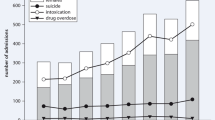Summary.
Cardiac dysrhythmias are common in acute intoxications. However, epidemiological data is rare and restricted to specific substances. From 1995 to 2003 (until September) 91 285 inquiries of physicians and paramedics to a poison center regarding acute intoxications were analyzed revealing 9888 patients (10.8%) suffering from disturbances of the cardiac rhythm. In a first step of the explorative data analysis dysrhythmias were graduated into three categories (I: tachycardia/bradycardia; II: arrhythmia/conduction disorder; III: ventricular dysrhythmia/cardiac arrest) and the frequencies of the involved substances were determined. In a second step substances which resulted to be of significant interest were investigated for their specific pattern of dysrhythmias. For category I (n = 8730) predominatly tricyclic antidepressants, neuroleptics, benzodiazepines, betablockers, and nonsteroidal antiinflammatory drugs were registered (II: [n = 949] tricyclic antidepressants, digitalis glycosides, benzodiazepines, neuroleptics, Caantagonists; III: [n = 209] tricyclic antidepressants, neuroleptics, sotalol, ethanol, central nervous system stimulants). Tricyclic antidepressants resulted in 23.4% of the reported cases in symptoms of category I (II: 2.3%, III: 0.6%; n = 8535). The highest rates of dysrhythmias were observed for sotalol (I: 34.7%, II: 21.6%, III: 8.0%; n = 176) as compared to the lowest rates found for paracetamol (I: 5.2%, II: 0.3%, III: 0.1%; n = 6429). The present investigation provided a comprehensive clinical overview about the frequency of dysrhythmias and involved substances during acute poisonings in emergency medicine. Furthermore, the specific effects of selected substances concerning dysrhythmias could be determined in view of a clinical database.
Zusammenfassung.
Herzrhythmusstörungen bei akuten Vergiftungen sind häufig, aber Angaben zur Epidemiologie sind selten und auf spezifische Substanzen beschränkt. Von 1995–2003 (bis September) wurden 91 285 Giftnotrufanfragen von Notärzten bezüglich akuter Vergiftungen analysiert, wobei 9888 Patienten (10,8%) mit Herzrhythmusstörungen beobachtet wurden. Zunächst wurden die Rhythmusstörungen in drei Kategorien eingeteilt (I: Tachykardie/Bradykardie; II: Arrhythmie/Leitungsblockierung, III: ventrikuläre Rhythmusstörung/Asystolie) und die Häufigkeiten der beteiligten Substanzen ermittelt. Danach wurden besonders häufig auftretende Substanzen bezüglich ihrer spezifischen Rhythmusstörungen untersucht. In Kategorie I (n = 8730) wurden überwiegend trizyklische Antidepressiva, Neuroleptika, Benzodiazepine, Betarezeptorenblocker und nichtsteroidale Antirheumatika registriert (II: [n = 949] trizyklische Antidepressiva, Digitalisglykoside, Benzodiazepine, Neuroleptika, Kalziumantagonisten; III: [n = 209] trizyklische Antidepressiva, Neuroleptika, Sotalol, Ethanol, Psychostimulanzien). Trizyklische Antidepressiva verursachten in 23,4% der berichteten Fälle Symptome aus Kategorie I (II: 2,3%, III: 0,6%; n = 8535). Die höchste Rate an Rhythmusstörungen wurde für Sotalol beobachtet (I: 34,7%, II: 21,6%, III: 8,0%; n = 176), während die niedrigste Rate für Paracetamol ermittelt wurde (I: 5,2%, II: 0,3%, III: 0,1%; n = 6429). Die aktuelle Untersuchung liefert einen umfassenden klinischen Überblick über die Häufigkeit von Rhythmusstörungen und die beteiligten Substanzen bei akuten Vergiftungen in der Notfallmedizin. Darüber hinaus konnten die spezifischen arrhythmogenen Effekte von ausgewählten Substanzen anhand einer klinischen Datenbank ermittelt werden.
Similar content being viewed by others
Author information
Authors and Affiliations
Corresponding author
Rights and permissions
About this article
Cite this article
von Mach, MA., Brinkmann, X. & Weilemann, L.S. Epidemiology of cardiac dysrhythmias in acute intoxication. Z Kardiol 93 (Suppl 4), iv9–iv15 (2004). https://doi.org/10.1007/s00392-004-1402-4
Issue Date:
DOI: https://doi.org/10.1007/s00392-004-1402-4




